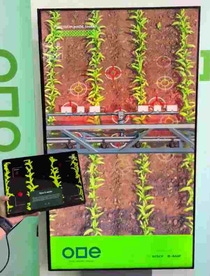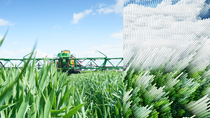Agriculture
Artificial Intelligence: The Beauty Of Scaling Up Brainpower
Not only humans, but also computers can learn. Artificial intelligence is essential for progress in the digital world. Curious how this can also be useful in agriculture?
What is Artificial Intelligence in agriculture?
Artificial intelligence (AI) in agriculture applies computer or machine learning from data to bring efficiencies and solutions to farming and the food supply. This allows more informed decisions to be made from large and complex data sets than would be possible by a person alone. For example, AI algorithms used in agriculture, specifically in digital farming, can identify images and patterns in data, and continuously learn from this information, then adjust to make more timely and better agronomic recommendations to optimize crop production for farmers. The performance of these algorithms is also enhanced over time with the inclusion of new data, for example incorporation of new sources of field-specific data or hyper local weather information results in faster and more precise agronomic recommendations.
How can AI help farmers, society, and the planet?
Technology is opening possibilities in farming, along the entire food value chain. Artificial intelligence is one of the technologies leading the transformation of agriculture for the better. Consider better decisions on which varieties to plant, recognition and prediction of pest outbreaks, and what and when to apply pest control products based on vast environmental data. Incorporation of more data in decision making allows farmers to protect and improve yield quality and quantity, while farming sustainability and protecting biodiversity at the same time.

Simulation of ONE Smart Spray technology in a corn field
Green targets are weeds detected but not sprayed due to the sensitivity levels chosen by the user, while red targets are weeds being sprayed with herbicides. The smaller screen shows the system vision distinguishing crops from weeds.
How is BASF using AI to bring solutions to farmers?
Artificial intelligence has wide applications and is deployed across R&D and even out to the field. Farmers are already using advanced smart farming products from BASF’s xarvio® Digital Farming Solutions. With xarvio FIELD MANAGER, farmers can conveniently monitor crop growth throughout the season and receive agronomic advice specific to individual field needs. The AI algorithms used here combine and continuously analyze historical agronomic information from the farm, along with in-season risks, weather data and satellite-based biomass images, to deliver timely and clear agronomic recommendations to optimize crop production.
The ONE Smart Spray technology, a joint venture of Bosch and BASF, applies artificial intelligence precision treating weeds. The technology combines high-tech camera sensor technology and software from Bosch with the agronomic logic and intelligence of our xarvio Digital Farming Solutions platform. Cameras and sensors are positioned on the boom of a sprayer, and as the sprayer passes over a field it can in milliseconds precisely detect weeds in crop rows based on its acquired images and weed recognition algorithms. It then spot applies herbicide only where and when needed in the right dose based on xarvio recommendations.
In plant breeding operations, AI enables scientists and breeders to easily relate genomic sequences with beneficial traits, making genomic selection and trait mapping much more productive. Data use is accelerated, making breeding both faster and more cost effective. This translates to the production of more accurate and environmentally robust varieties so that farmers can produce enough for the growing population and earn a living.
BASF in AI
“Inside the Smart Spraying Collaboration between AGCO and BASF” (Podcast) - Precision Farming Dealer interviewed Joe Dimler of AGCO on the artificial intelligence component of the ONE Smart Sprayer: “So the system has been trained by repetition, so it uses its logic based off of all of the imagery that it has seen and collected in the past, and so we’re talking about millions and millions of images that it has the ability to use as a reference. Every time it sees a new image, it’s going to go back to its model that was based off of all of these millions of images. And so as you go, you basically create a database that allows you to basically have seen just about every little type of scenario that you may see in each field because you've ran the machine that much and you have that many images to go back to look and compare against.”
“AI farming tool from BASF finds fertile ground in Japan’s rice country” (Article) Taito Kurose, Nikkei Asia staff writer, reported “German chemical group BASF has gained a foothold in Japan’s rice country with a tool that uses artificial intelligence to help skilled farmers make up for a shortage of labor. Yamazaki Rice, based near Tokyo in Saitama prefecture, began using BASF’s xarvio Field Manager system this year with five workers on about 100 hectares of land. xarvio provides real-time analysis informed by satellite and weather data. Automated maps customize the amount of fertilizer recommended for each section of the farm. The data is fed to GPS-equipped farm equipment. The AI gives daily suggestions that Yamazaki Rice’s president said helped improve yields by up to 25% in some fields. xarvio’s machine learning covers more than 10 years of crop data as well as scientific papers worldwide.”
“BASF and TECNALIA accelerate R&D of new crop protection products through digitalization” (Press release). “Our collaboration with TECNALIA, started in 2014, enables us to employ state-of-the-art algorithms based on artificial intelligence and machine learning,” said Ramon Navarra-Mestre, Head of Global Agricultural Research Stations at BASF. “This new, efficient technology provides us with more reliable information from our global field trials network as the image recognition assessments can be done more frequently and deliver more objective data compared to traditional methods.”
BASF and Alteia collaboration to deploy vision AI for seed breeding and seed production monitoring (Alteia) - BASF is partnering with Alteia for the use of an AI platform to turn visual drone data to decision support systems from the solutions tested in BASF field trials.
What are others saying about AI in agriculture?
Forbes: How AI is Cropping Up in the Agricultural Industry – In February of 2023, Wendy Gonzalez, Forbes Councils Member, wrote, “The autonomous-farming industry is beginning to boom, with approximately 200 AI-based agricultural startups in the U.S. alone. Examples of artificial intelligence on farms include self-driving tractors and combine harvesters, robot swarms for crop inspection and autonomous sprayers. Indoor farming companies like Plenty and AppHarvest are also using AI and computer vision to collect data on crops and adjust the environment for optimal nutrition and flavor. They also use robots to harvest the food. Blue River Technology uses machine vision and artificial intelligence to differentiate crops from weeds, allowing for targeted herbicide application and less human labor.”
Successful Farming: Agriculture embraces artificial intelligence – For the November 2022 publication, Gill Gullickson interviewed Ashwin Madgavkar founder of Ceres Imaging, “AI alone is no silver bullet. It's still important to combine computer vision-derived data with a local agronomist and or/farmer input to make a recommendation. However, AI technology can help an agronomist make better use of his or her time in targeting fields most likely to benefit from in-season treatments.”
European Parliament: Artificial Intelligence in the Agri-Food Sector – In a study published in March of 2023 on the applications, risks and impacts of AI in the agri-food sector, the European Parliament raised the following questions: “how to balance potential benefits against potential risks; how to govern the use of these technologies; and how to incorporate socio-ethical value considerations into the policy and legal frameworks under development. Policies for training and education have to support potential users.”
Learn More About Trends In Agriculture
Related topics
Last Update January 29, 2024

